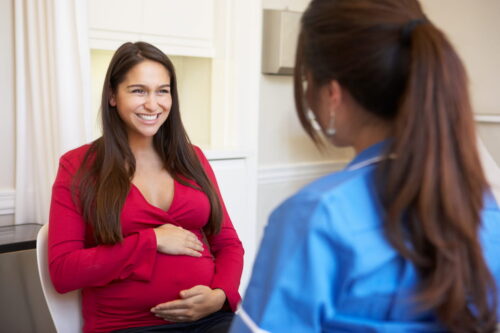Landmark Visits
 New OB Visits
New OB Visits
After 8 weeks of gestation, you will be scheduled for your first appointment we call a New OB Visit. During this visit, we will take a full set of vitals and update your information that we have on file. During this appointment, we will verify your gestation starting point and begin entering information that we will refer to during your pregnancy. During this appointment, laboratory tests and an ultrasound may be scheduled.
9-Week Panorama (Optional Visit)
At 9 weeks of gestation, your medical provider may offer Panorama testing. Panorama is a genetic prenatal screening laboratory blood test that checks for common chromosomal conditions that may affect a baby’s health. Because this test is expensive, please call your insurance provider to see if you have coverage for this test.
16-Week Quad Screen (Optional Visit)
Your medical provider may offer the quad screen test at 16 weeks of gestation. This test checks for Down syndrome and other abnormalities like spina bifida and other chromosomal conditions.
20-Week Complete OB Ultrasound
This exam is an exciting and important examination which includes a complete obstetrics (OB) ultrasound. The complete OB ultrasound can take as long as an hour and in some cases, like with twins, may take up to two hours. The complete OB ultrasound reviews all anatomy including the sex of the fetus. Learn more about ultrasounds and how to share them on our ultrasound page.
28-Week Glucose Tolerance Test
Gestational diabetes is a concern during pregnancy, so your medical provider will order this test at 28 weeks of gestation. Gestational diabetes can cause complications during pregnancy for both you and the baby so we want to test for it. The test is an oral glucose tolerance test (GTT) that measures your body’s response to sugar. Learn more on our Gestational Diabetes page.
34 Weekly Urine Tests Begin
At 34 weeks of pregnancy, we will begin weekly urine tests to check for glucose and protein. These tests continue to check for gestational diabetes as well as other conditions like dehydration, urinary tract infections (UTI) and preeclampsia, which is pregnancy-induced high blood pressure. These tests are done to monitor your health as your pregnancy progresses.
36 Week Bacteria Test
At 36 weeks of pregnancy, we will perform a test that will check for bacterial infection. During birth, some babies can become sick if bacteria is present during birth so we want to test for any vaginal bacterial. This test, called a GBS test, is a simple and painless vaginal swab that will help identify bacteria so that antibiotics can be prescribed if needed.
Newly Pregnant Assistance
If you are newly pregnant and would like some assistance getting started with a healthcare provider, please call 208.557.2900 or fill out the form below and one of our caring Rosemark nurses will reach out to you.

